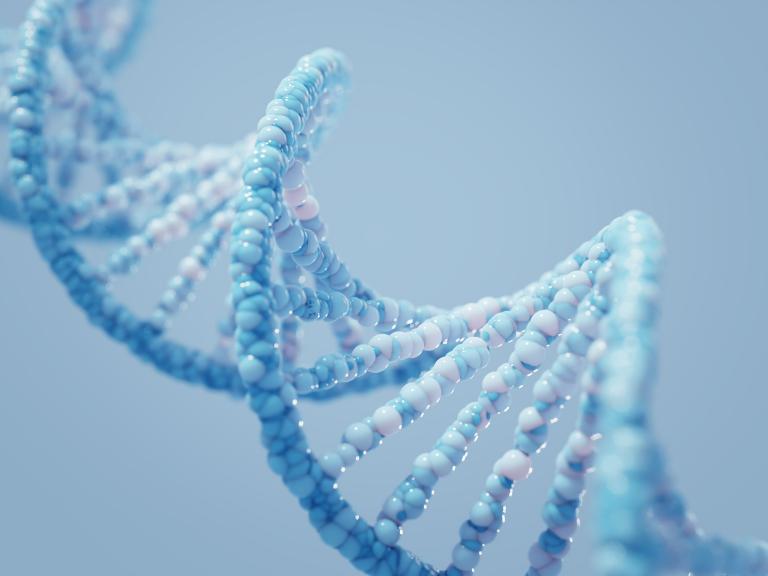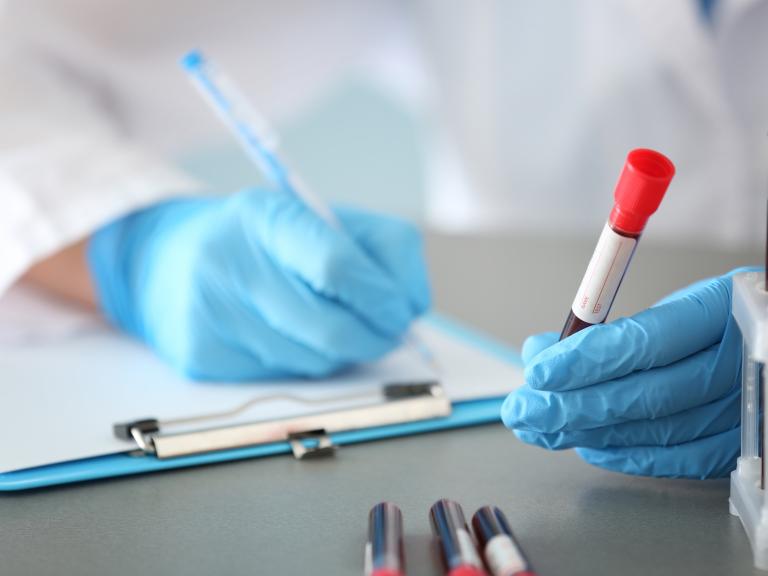Rapid data sharing is essential for advancing research on infectious and immune-mediated diseases. NIAID supports broad sharing of research data, while protecting the privacy of human research participants. Read on to learn how to navigate data sharing policies at NIAID and the National Institutes of Health.
Jump to:
- NIH Data Sharing Policies
- Guidance for NIAID Researchers
- Additional Resources for Sharing and Accessing Data
NIH Data Sharing Policies
Scientific and genomic data from NIAID-funded and conducted research should be shared according to the NIH data sharing policies below.

Data Management and Sharing (DMS) Policy
NIH issued the Data Management and Sharing (DMS) policy to promote the sharing of scientific data. Effective as of January 25, 2023, the DMS policy sets expectations for planning and budgeting for data management and sharing, submitting a DMS Plan when applying for funding, and implementing the DMS Plan throughout your research.

Genomic Data Sharing (GDS) Policy
Genomic data is a critical shared resource and valuable tool for research that benefits the scientific community. To facilitate the translation of research results into applications that improve human health, NIH expects institutions and researchers to broadly and responsibly share genomic data generated by NIH funds.

Which Policies Apply to My Research?
Along with the GDS and DMS policies, NIH has sharing policies addressing topics from model organisms to publications. NIH offers an online tool to help researchers determine which NIH data sharing policies apply to their research.
Guidance for NIAID Researchers
What data types should be shared?
NIAID expects sharing of data and metadata associated with funded research using common data standards, if possible. Any ethical, legal, and/or technical factors that may affect sharing can be detailed in the Data Management and Sharing (DMS) Plan. Data types may include, but are not limited to, genomic, transcriptomic, imaging, proteomics, metabolomics, immunological, flow cytometry, protein structures, and clinical data from human research participants generated during research projects and/or clinical trials.
The DMS policy requires sharing of all scientific data, defined as all data necessary to replicate research findings regardless of whether the data are used to support scientific papers. For example, for clinical trials, this includes data for primary, secondary, and additional endpoints. However, not all data must be shared, including data resulting from calibration or preliminary analyses. See NIH guidance for additional details.
NIAID expects that researchers share de-identified human research participant-level data from NIAID-funded or conducted clinical trials through controlled access platforms, such as AccessClinicalData@NIAID, dbGaP, Vivli, etc. Registration of studies on ClinicalTrials.gov will not be sufficient to meet data sharing requirements. Guidance is available on Protecting Participant Privacy When Sharing Scientific Data.
What is metadata?
Metadata is additional labeling of your data. This “data about data” describes data contents and structure and makes research data “discoverable” by linking it to publications and funding information. Applying metadata allows other researchers to interpret and reuse your data and prevents misuse, misinterpretation, and confusion.
The exact metadata or other associated documentation will vary by scientific area, study design, the type of data collected, and characteristics of the dataset. Metadata or other information associated with research data may include the methodology and procedures used to collect the data, data labels, definitions of variables, and any other information necessary to reproduce and understand the data.
Where do I share data from NIAID-funded or conducted research?
NIAID encourages the use of established domain-specific repositories for data sharing to support effective data discovery, access, and reuse. To select a repository for sharing data, review the list of NIH-Supported Data Sharing Resources, including NIAID-preferred repositories. When domain-specific repositories are not available, NIAID encourages researchers to share data via widely used generalist repositories. Read more about selecting a data repository.
It is common practice for researchers to share data as supplementary material to journal articles. However, making data available solely through publications, supplemental material, etc. is not compliant with the NIH DMS policy.
When do I share data from NIAID-funded or conducted research?
The NIH DMS policy requires data sharing at the time of publication or at the end of the performance period, whichever comes first. NIAID strongly encourages scientific data to be shared as rapidly as possible. All scientific data generated by a study, including data beyond that used to support a publication, should be shared before the end of the performance period.
Human and non-human genomic data subject to the Genomic Data Sharing (GDS) policy must still comply with the GDS policy timeline expectations for data submission and sharing. To determine if your research is subject to the GDS policy, please review when the GDS policy applies.
In some instances, data sharing before publication or the end of the performance period may be warranted, such as during public health emergencies. See NIH guidance for details on data submission and sharing timelines.
How do I develop a DMS Plan?
Under the DMS policy, NIH expects investigators and institutions to:
- Prepare a DMS Plan and budget for managing and sharing scientific data.
- Submit a DMS Plan when applying for funding.
- Comply with the approved DMS Plan.
Before you apply for NIAID funding, determine if your application falls under the DMS policy using resources available on Research Covered by the 2023 DMS policy. If your application is subject to the Genomic Data Sharing policy, your DMS Plan should address genomic data considerations.
You can find more information on the steps for developing and submitting a DMS Plan in NIAID’s Data Management and Sharing for Grants SOP.
Are there any NIAID-specific data sharing policies?
All NIAID researchers should comply with the NIH DMS policy and other relevant NIH policies. Check the notice of funding opportunity and review institute- and center-specific data sharing policies to determine if you should consider additional data sharing requirements.

Resources for Sharing and Accessing Data
The following resources can help NIAID researchers with data sharing and access in controlled-access, NIH-supported repositories.
Genomic Program Administrators (GPAs)
The NIAID Genomic Program Administrators (GPAs) assist investigators with study registration and data submission to controlled-access repositories, such as dbGaP, and serve as experts on the Genomic Data Sharing (GDS) policy for NIAID. Divisional GPAs provide support to investigators funded by or within the NIAID divisions, with assistance from the overall NIAID GPA in the Office of Data Science and Emerging Technologies.
Principal Investigators should direct questions related to data management, sharing, and policies to their Program Officers (POs). Questions from POs on these topics should be directed to their divisional GPA or the overall NIAID GPA (niaid_datasharing@niaid.nih.gov).
Data Access Committee (DAC)
The NIAID Data Access Committee (DAC) provides guidance and oversight of controlled-access data housed within NIH designated repositories, including dbGaP and AccessClinicalData@NIAID. Learn more about requesting access for these and other NIH-funded repositories from the NIH's Accessing Scientific Data page and How to Request and Access Datasets from dbGaP page.
We encourage controlled access data repositories that host NIAID data to use the NIAID DAC for review of their Data Access Requests. Please contact niaid_datasharing@niaid.nih.gov with any questions about the NIAID DAC.
Data Sharing Resources and Training
NIH Resources
- NIH Scientific Data Sharing Website: Find more information about NIH data sharing policies and guidelines.
- NIH Data Sharing News and Events: Find webinars, news articles, and conferences about NIH data sharing.
- NIH Data Sharing and Reuse Seminar Series: Watch seminars from the NIH Office of Data Science Strategy that highlight exemplary data sharing and reuse.
- Understanding the New NIH DMS Policy, Part 1 and Part 2: Watch the two-part webinar from NIH explaining the DMS policy, from August-September 2022.
NIAID Resources
- NIAID Funding News: Read NIAID articles on data management and sharing.
- NIAID Data Ecosystem Discovery Portal: Search for infectious and immune-mediated disease data across many data repositories.
- Create Resource Sharing Plans: Learn how to create a unified Resource Sharing Plan as a part of your funding application.
- Create Other Sharing Plans—Data Management and Sharing: Learn more about creating a DMS Plan as part of your funding application.
- Apply for a Grant: Learn more about applying for funding with this step-by-step guide.
External Resources
NIAID cannot attest to the accuracy of a non-federal site. Linking to a non-federal site does not constitute an endorsement by NIH or any of its employees of the sponsors or the information and products presented on the site.
- DMPTool: This tool can help researchers create data management plans (DMPs), including NIH-GEN DMSP.


